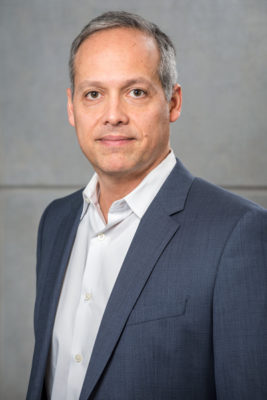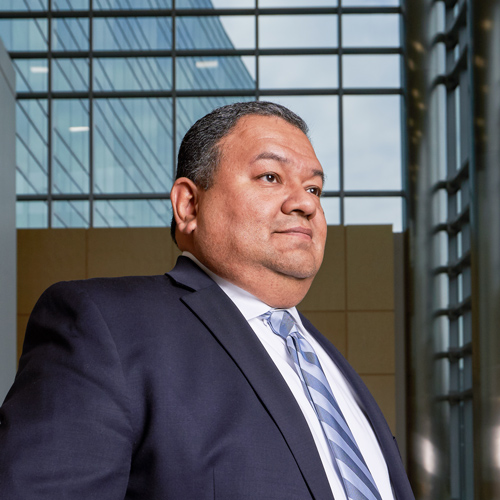|
Getting your Trinity Audio player ready...
|

As a child growing up in Venezuela in the 1970s and 1980s—an era in which the country was at its zenith of prosperity—Alejandro Rivero quickly learned that where someone lives or works is about much more than square footage and structural integrity.
His father was a manager at a national oil company. From his time in elementary school to the end of high school, his family lived in a campo petrolero—a small manufactured city or company town for employees of the large oil refineries on the Caribbean coast.
“That was my first contact with international corporations, because daily life was closely intertwined with the activities of the company,” says Rivero, who is currently the director of corporate real estate for Samsung Electronics America. “Every day, we were exposed to the culture and idiosyncrasies of a community of people from all regions of the country as well as from the US, the Netherlands, and Asia.”
That’s not to say that Rivero, who manages Samsung’s US real estate portfolio, ever envisioned a career in real estate. After graduating with a degree in mechanical engineering from Universidad San Bolivar, he became a project manager. His first projects involved designing and installing industrial HVAC systems for high-end computer rooms. The process enthralled him.
“I vividly remember stepping back after months of work and feeling those machines come to life,” he says. “It was something I could look at and say, ‘We built this.’ I also liked that construction projects are often intense experiences where you spend long hours trying to mitigate risk and push things forward. You also tend to bond with people on the team and form long-lasting relationships.”
His primary interest in the field had been design and construction. As time went on, Rivero began to learn and understand the business side. After several years working with the company, he immigrated with his family to the US, where he got his MBA at Babson College in Boston, graduating cum laude.
For seven years after graduate school, Rivero worked as an engineering consultant and analyst. In 2005, he was offered a position heading a corporate real estate division. He certainly didn’t consider real estate an area of expertise, but it was an interesting challenge.
“I didn’t know what I was getting into,” Rivero says. “I had worked as an engineer and a consultant, but I didn’t have any technical knowledge about real estate. I had an idea that it was a function that wasn’t much appreciated. Negotiating leases? Managing buildings? Boring. However, there was something that sounded very interesting: designing and building workplaces.”
Walking into the midst of projects already under way, Rivero encountered technical lingo he had never heard before: ROFO, holdover, TI allowances, as-builts. Wading through the unknown, he quickly found that the similarities to what he had done before outweighed the differences. For example, he was dealing with architects and engineers, as he had before.
“After a few weeks, I began to see that this wasn’t so much different from my first jobs managing engineering projects,” he says. “As my experience grew and the technical aspect became more familiar, I started to see the strategic role real estate now plays in large companies. It’s not about the real estate; it’s about leveraging real estate to attract and keep the best people engaged and productive. I discovered this has multiple times more value than the cost of the rent.”
Jones Lang LaSalle’s Matthew R. Astrachan says he’s fortunate to have worked with Rivero for more than thirteen years. “He’s loyal, principled, and creates the best cost-efficient work environment,” says the vice chairman and licensed corporate real estate broker. “Always prepared and thoughtful, he relates as effectively to the C-suite as he does to construction workers.”
It was in July 2015 that Rivero joined Samsung, in the position he still occupies today. And again, it was the challenge that drew him to the role. He was being tasked with creating corporate real estate as a formal function. It was a bit like when he had built HVAC systems early in his career: the pleasure of making something from nothing and then watching it come to life.
“One of the things that attracted me to Samsung was the opportunity to set up a new department from scratch,” he says. “The main challenge I faced was the fragmentation of the information on the portfolio and how to get a handle on what assets or leases we had. Also, I wanted to quickly understand the organization and culture of the company. Samsung is a very large and diversified business, so I had to learn the different product lines, locations, and the right people to talk to when I needed to ask a question.”
Three years into the role, Rivero says he’s found a job that keeps him constantly on his toes and calls on all the skills he has developed throughout his career. Part of that is because of the company itself, and part of it is the ever-changing industry.
“While corporate real estate skills can be transferred across different industries, there was certainly a learning curve as I tried to get my arms around the business itself,” he says. “I continue to learn about how innovation drives everything at Samsung. I’m happy with the progress we’ve made, but there is still a lot to do. The tech and electronics industry is always trying new things, and that translates into dramatic growth in certain businesses and consolidation in others. My challenge going forward is to provide the agility to meet those demands.”

